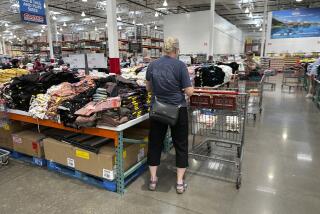Australia’s Dollar May Rise With Rates
- Share via
Australia’s dollar may rise amid speculation the nation’s central bank will raise interest rates later this year after a government report showed inflation accelerated in the first quarter.
Consumer prices rose 0.9% from the fourth quarter as housing and food became more expensive. From a year ago, consumer prices increased 2%. The Reserve Bank of Australia aims to keep annual inflation between 2% and 3% and has kept its benchmark interest rate at 5.25% in 2004 on signs that rate increases late last year have slowed spending and borrowing.
The consumer price report “reinforces the prospect of higher interest rates in the second half of the year,” said John Horner, senior strategist at SG Australia Ltd. in Sydney. “This will provide ongoing support for the Australian dollar given we already have the highest interest rates in the developed world.”
Australia’s dollar was buying 73.34 U.S. cents in trading today in Sydney, up from 73.28 cents in late trading Tuesday in Asia.
The currency traded as high as 73.65 cents but retreated as some Japanese traders trimmed their holdings ahead of Japan’s Golden Week Holidays, said traders such as Rick Lloyd, head of Group of Seven currency trading in Asia for ABN Amro Holding in Sydney.
“There is some selling” of the Australian dollar “from Japanese accounts squaring up ahead of Golden Week,” Lloyd said.
The median forecast in a Bloomberg News survey of 17 economists was for consumer prices to rise 0.7% in the three months ended March 31 after gaining 0.5% in the fourth quarter. Prices in the fourth quarter rose 2.4% from a year earlier, the lowest annual increase since the last three months of 1999.
In February, the central bank said it expected the inflation rate to drop to as low as 1.5% this year, before increasing in 2005.
Australia’s dollar has gained 18% against its U.S. counterpart in the last year, and its strength means imports are cheaper.
Cheaper imports are being more than offset by gains in domestically generated inflation, up 4.1%, and this may encourage the Reserve Bank to raise interest rates later this year, SG Australia’s Horner said.
Australian Treasurer Peter Costello said after the release of the report that “it looks as if global interest rates will rise in the course of the next year, particularly as the U.S. comes out of recession and its economy starts growing.”
More to Read
Inside the business of entertainment
The Wide Shot brings you news, analysis and insights on everything from streaming wars to production — and what it all means for the future.
You may occasionally receive promotional content from the Los Angeles Times.









